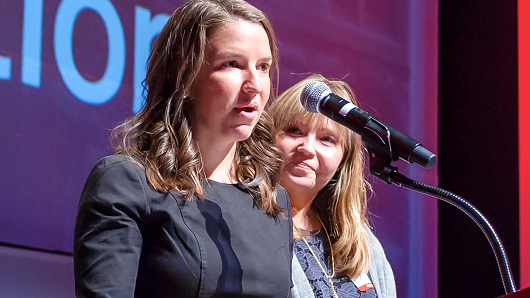

Start-ups typically flock to Silicon Valley to cozy up to venture investors and tap into local tech talent.
But Guild Education, which was founded in 2015 at Stanford University, left San Francisco as soon as its founders realized the cost of living and hiring there could hamper the company’s growth.
“We have a lot of women who are executives and department heads here, starting with myself and my co-founder,” CEO Rachel Carlson said. “So when we left, we deliberately chose a place where you can have a family.”
Now based in Denver, Guild Education set up shop next door to a Montessori school.
“We were joking that we’re the polar opposite of Apple,” said Carlson. “Remember when the new ‘Mothership’ came out? Every single parent noticed that it had a huge gym but not a day care.”
Standing apart from the Valley makes sense for Guild in another way, Carlson said. “We work with the 64 million adults in the U.S. who don’t have college degrees to help them get ahead in their careers.”
Primarily, Guild helps large employers extend education benefits, including tuition reimbursement, to workers who have dropped out. According to data cited by Guild from the National Student Clearinghouse Research Center, 31 million working adults in the U.S. have tried to go back to school but dropped out, typically because of problems balancing a work and school schedule.
The move can help a company retain great workers and make sure that they’re “upskilling,” or preparing to take on new roles and responsibilities.
The Guild Education site guides workers to online courses provided by trustworthy, accredited institutions of higher education, instead of dubious for-profits. The online courses are usually flexible, and don’t require a student to leave during the workday to complete a lesson or take an exam.
Guild measures how well students are doing in terms of course completion, with advisers nudging and cheering students if they’re falling behind, or suggesting tweaks and techniques that can help them complete a desired course, degree or other credentials.
Some of the most popular courses and degrees completed via Guild are around English as a second language, business writing, administration, human resources, management and nursing. The company plans to expand into computer science and coding skills in the near future (the kind of credentials that can keep people working after the robots arrive).
Carlson said Guild hasn’t worked with large tech companies much yet, because they tend to outsource custodian and building security jobs, or jobs in food service, which is where most people without college degrees find work. Businesses like Sodexo or Compass Group that supply such services to Amazon, Apple, Facebook or Google are more likely to be Guild Education clients.
So far Guild has signed Chipotle, the Hospital Corporation of America and DaVita, among other large employers.
Guild also told CNBC it has raised $21 million in a second round of venture funding that has now drawn about $30 million. The company’s valuation is $125 million. Investors included Bessemer Venture Partners, Redpoint Ventures, Social Capital, Harrison Metal and Cowboy Ventures.
Correction: An earlier version misspelled the last name of Rachel Carlson.
[“Source-cnbc”]




